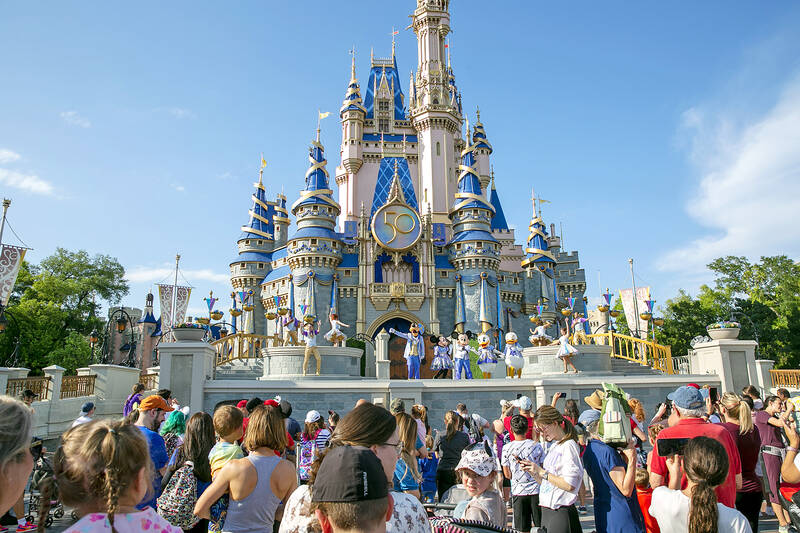A: As we enter the new year, is there anything to look forward to in 2023?
B: Sure, events such as King Charles III’s coronation, FIFA’s Women’s World Cup in New Zealand and Australia, and India surpassing China as the most populous country are all highly anticipated.
A: And my favorite — Disney — also celebrates its centennial anniversary.

Photo: AP 照片:美聯社
B: Really? Let’s go to Disney World for the grand celebrations.
A: 進入新的一年,會有什麼令人期待的事物嗎?
B: 英國國王查爾斯三世的加冕典禮、世界盃女足賽將在紐、澳開踢、印度人口超越中國……這些都將是今年的大事!
A: 我最喜歡的迪士尼,今年也即將歡慶一百週年了。
B: 真的嗎?我們去迪士尼樂園園一起慶祝吧。
(By Eddy Chang, Taipei Times/台北時報張聖恩)

Like people in many other countries, Taiwanese are fond of delicious fried snacks. For example, Spain is known for its churros, and in Taiwan there is a traditional fried dessert made of sticky rice called beh teung guai. The snack consists of sticky rice flour that is mixed with water, kneaded into a dough and shaped into small pieces. Once fried, the sticky rice balls are coated in crushed peanuts and sugar mixture. 世界上有許多國家愛吃炸甜點,台灣也不例外。舉例來說,西班牙有吉拿棒,台灣人則有油炸糯米的點心──白糖粿。作法先將糯米粉和水混合揉成糰,再捏成小塊,炸好後裹上花生糖粉。 knead (v.) 揉(麵糰、黏土),捏;捏製;揉捏形成 Beh teung guai is a traditional snack that has been enjoyed by many senior citizens since

WHEN ARE THE OLYMPIC AND PARALYMPIC GAMES? The Paris 2024 Olympics will run from Friday to Aug. 11, while the Paris 2024 Paralympics will be held from Aug. 28-Sept. 8. WHERE WILL THE GAMES TAKE PLACE? In September 2017, the International Olympic Committee (IOC) awarded Paris the 2024 Games when its only remaining rival, Los Angeles, agreed to wait another four years to be the host city. Paris has hosted two Olympics and will stage the event 100 years after its last Games in 1924. The Games will be staged in 35 venues across Paris, Ile-de-France, on both mainland France and overseas. Some notable venues

A: The 2024 Paris Olympics is set to open tomorrow (Saturday Taiwan time), and will run until Aug. 11. B: How many Taiwanese athletes will compete in the Olympics? A: About 60 Taiwanese athletes will participate in 16 sports. B: I’ve heard some Olympic gold medalists, such as weightlifter Kuo Hsing-chun, and badminton duo Lee Yang and Wang Chi-lin, will compete in the Olympics again. A: Asian tennis star Hsieh Su-wei, who is the World No. 1 in women’s doubles, is also on the Taiwan team. Let’s give our support to the Taiwanese players. A: 巴黎奧運自7月26日(台灣時間27日),至8月11日要登場啦。 B: 台灣有多少選手參賽? A: 台灣有60名選手參賽,將參加16項運動種類。 B: 這次奧運金牌舉重名將郭婞淳、羽球男雙李洋/王齊麟都會參賽。 A:

You might have seen athletes gracefully bending and leaping in rhythm with melodies. This is “rhythmic gymnastics,” a sport often mistaken for artistic gymnastics. However, the two are distinct in focus and presentation. Artistic gymnastics focuses on strength, flexibility, and balance, with athletes performing solo on various equipment. They are scored based on the difficulty of their movements, their execution of certain skills on each apparatus, and their ability to combine multiple skills into different movements. Rhythmic gymnastics, on the other hand, emphasizes style and presentation, with athletes often performing in teams. Moving in harmony with music, they use